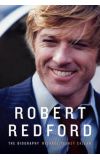
22 May 2011 04:58:08
For film fans, the simple message of "Robert Redford: The Biography" may be that his talents have been underappreciated. Starring in popular movies like "The Sting" and "Out of Africa" and smaller films like "Downhill Racer" and "The Candidate" hasn't led to the artistic respect other actors enjoy. Nor has directing fine films like "Ordinary People," "A River Runs Through It" and "Quiz Show" ranked him among top directors.
Actually, nothing about Redford is simple. Author Michael Feeney Callan details the struggles and the failures, personal and professional, that Redford has endured while pursuing a life of spiritual and artistic independence.
Opposing ambitions have marked his 74 years. As a teenager Redford was a good kid by day and a delinquent by night. More intent on becoming Modigliani than Spencer Tracy, he eventually abandoned art when he found the stage to be the best venue for self-expression. He would remain a loner at heart, throwing himself into friendships and causes but eventually pulling back.
As a movie star, Redford enjoyed the money and influence, but he resisted predictable career choices and could turn indignant over his fame. An environmentalist, he created a ski resort, film institute and film festival in the Utah wilderness. Although eager to marry and raise children, he was often an absentee husband and father.
Callan allows Redford such a strong voice — the author had access to diaries as well as friends and relatives — that the book approaches autobiography. The upside is obvious: Redford's views are plentiful and enlightening for understanding how he sees his world.
Between the lines lay the downside of such an approach. Callan reports the various points of view in a dispute, an act of balance usually offset by Redford gaining the last word. Challenging his subject doesn't appear as high on Callan's agenda as it should be. (The claim that screenwriter William Goldman wrote just 10 percent of "All the President's Men," the rest coming from Redford and director Alan J. Pakula, is persuasively rebutted in the writers guild magazine Written By.)
Too often Callan turns to others, including Redford's children, to point out rationalizations and bad behavior, thus making Callan a strong reporter of fact but not as insightful a writer as a biography should demand.

